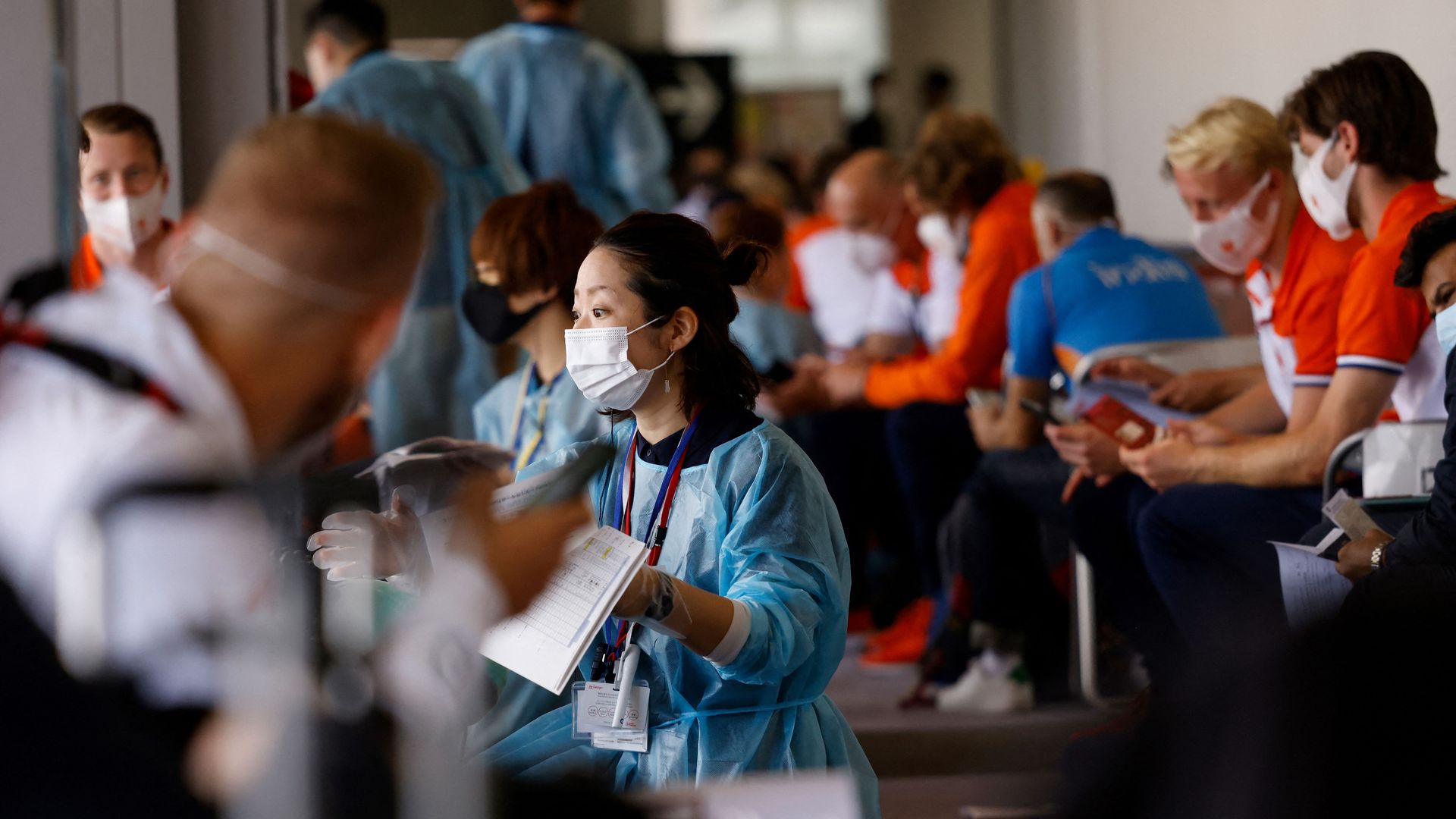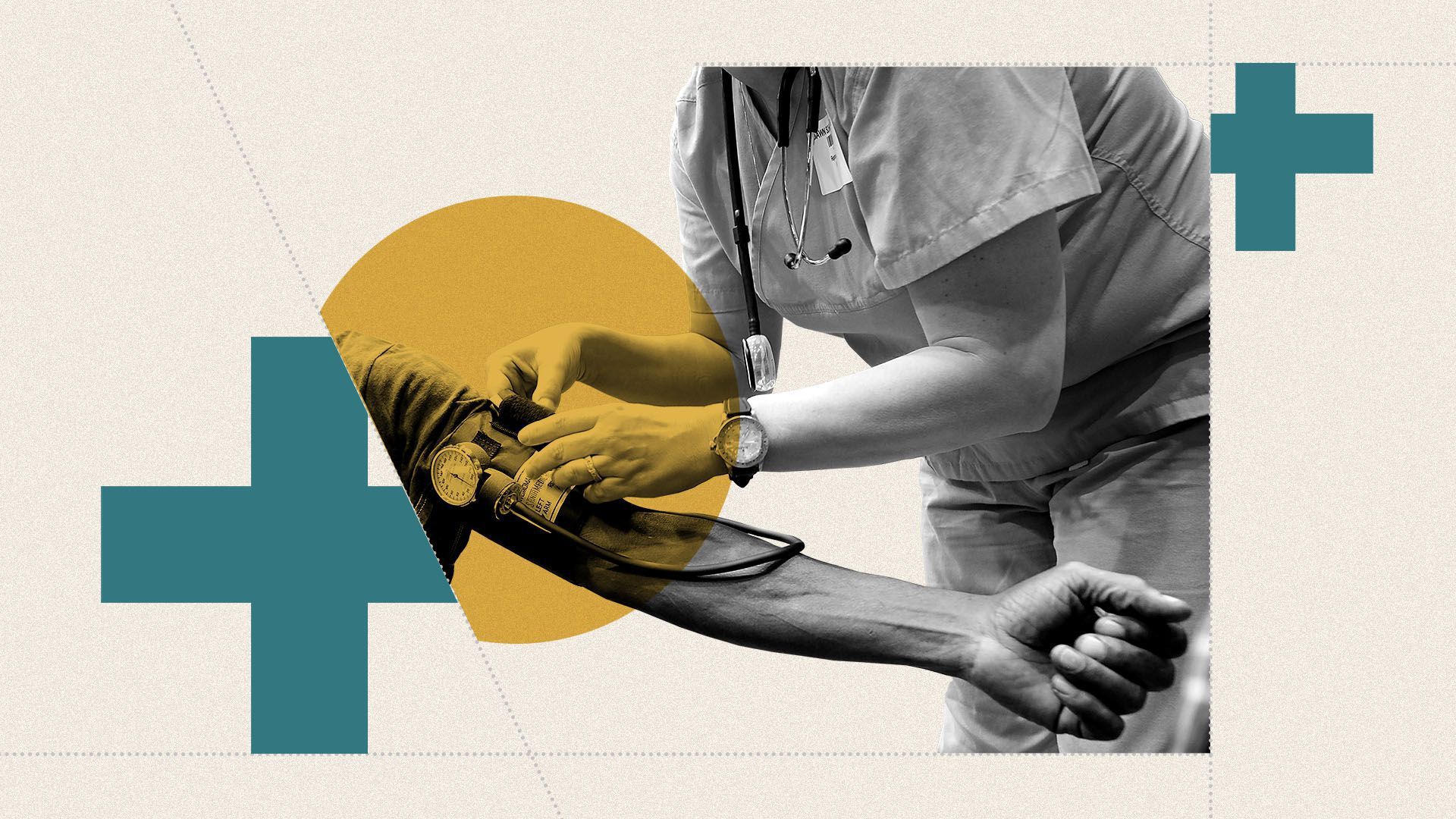| |
| |
| |
| Presented By PhRMA |
| |
| Axios Vitals |
| By Tina Reed ·Jul 19, 2021 |
| 🏖 Welcome back from the weekend, Vitals readers. Coming up this week: Top federal officials, including CDC director Rochelle Walensky and FDA interim commissioner Janet Woodcock are on deck for a Senate HELP Committee hearing tomorrow about the federal COVID response. - A CDC panel will meet Thursday to discuss Johnson & Johnson's vaccine including potential side effects, as well as booster shots.
Today's newsletter is 727 words, or a 3-minute read. |
| |
| |
| 1 big thing: U.S. COVID cases on the rise ... again |
 Data: Our World in Data; Chart: Will Chase/Axios Coronavirus cases, hospitalizations and deaths are back on the rise in the U.S. as the highly transmissible Delta variant spreads across the country, Axios' Sam Baker writes. The big picture: This is happening almost exclusively to people who aren't vaccinated, and it's worse in places where overall vaccination rates are low. "This is becoming a pandemic of the unvaccinated," CDC director Rochelle Walensky said Friday. By the numbers: The U.S. is now averaging about 26,000 new cases per day — up 70% from the previous week, Walensky said. Hospitalizations are up 36%, and deaths are up 26%, to an average of 211 per day. - Over 97% of the people currently hospitalized for severe COVID-19 infections were unvaccinated, according to the CDC.
- A small handful of states with especially low vaccination rates — Arkansas, Florida, Louisiana, Missouri and Nevada — are driving a plurality of new cases. One in five new infections comes from Florida alone, Walensky said.
The bottom line: This is, in large part, what experts anticipated in low-vaccination parts of the world. In the U.S, however, unlike much of the rest of the world, vaccines are free and readily available. All of these cases and deaths are preventable. |
    |
| |
| |
| 2. Olympics face early COVID test |
 |
|
| Members of the Netherlands delegation wait for screening and COVID testing upon their arrival in Japan on Sunday ahead of the Olympic Games. Photo: David Gannon-AFP via Getty Images |
| |
| In an early test of COVID surveillance at the Summer Olympic Games, several athletes have already tested positive for COVID-19 following arrival in Tokyo. But International Olympic Committee officials say they are confident the Games can be carried out safely. Why it matters: Infectious disease experts have raised alarm that, with the highly virulent Delta variant and the low vaccination rate in Japan, plans laid out by the IOC to prevent widespread transmission of the virus will fall short. - IOC officials pushed back, saying their multi-layered safety measures — which include social distancing and mask-wearing requirements, hand hygiene, and daily testing — will prevent a superspeader event.
"We're not saying there will be no cases because there will be cases," Brian McCloskey, chairman of the IOC's independent expert panel on COVID countermeasures told Axios. - "But our view is, we reduce the risk of individual cases becoming clusters or spreading events," McCloskey said in an interview Friday morning before the recent COVID cases were identified.
Go deeper. |
    |
| |
| |
| 3. Cleveland Clinic's about-face on Aduhelm |
 |
|
| Photo: Dustin Franz/Bloomberg via Getty Images |
| |
| Before the Cleveland Clinic said it would not administer Aduhelm, the new FDA-approved Alzheimer's drug, the hospital system was promoting the unproven drug on social media, Axios' Bob Herman writes. Why it matters: Cleveland Clinic was the first major medical center to say it would not use Aduhelm, and two hospital systems have followed the clinic's lead. - But the abrupt change could confuse patients, who were told less than two weeks ago by the Clinic that the drug offered "hope."
What they're saying: A Cleveland Clinic spokesperson said the article was about the trial, and "research is fundamental to our mission. We regularly provide updates on studies we are participating in." - The spokesperson did not address questions about the article being promoted after the FDA's approval and that the article said the drug offered "hope" even though there's conflicting evidence about whether the drug works.
Share this story. |
    |
| |
| |
| A message from PhRMA |
| People want choice and access to medicines in Medicare – not barriers |
| |
 |
| |
| In Washington, what politicians say and what they mean can be very different.
To save money, some politicians are willing to sacrifice access to medicines in Medicare. This could make it harder for seniors and those with a disability to get the medicines they need. There's a better way. |
| |
| |
| 4. The gender gap of hospital mortality rates |
 |
|
| Photo Illustration: Sarah Grillo. Photo: Spencer Platt/Getty Images |
| |
| The in-hospital mortality rate among patients treated by physicians who were women was lower compared with similar patients cared for by physicians who were men, Axios' Marisa Fernandez reports from a recent study published in JAMA. - To be clear, the difference was small. But it supports previous evidence that suggested women often have different behavioral characteristics in care that result in changes in outcomes.
"Female and male physicians may have been socialized to adhere to gender norms and expectations within a health care context but such behavioral differences are modifiable and not fixed," the researchers wrote. While the authors urge caution in perpetuating gender stereotypes, they say it's worth studying the behaviors of physicians that may explain the difference. |
    |
| |
| |
| 5. While you were weekending |
 |
|
| Illustration: Aïda Amer/Axios |
| |
- U.S. Surgeon General Vivek Murthy was on the Sunday morning circuit this weekend and told Dana Bash on CNN's "State of the Union" that misinformation not only harms people, "it costs them their lives."
- Dialysis provider DaVita and its former CEO Kent Thiry dispute charges brought by the Justice Department accusing them of labor market and collusion charges, the St. Louis Post-Dispatch reports.
- Citing "numerous scientific issues," editors at JAMA Pediatrics said they've retracted a controversial study that suggested masks might harm children by exposing them to high carbon dioxide levels, MedPage Today reports.
|
    |
| |
| |
| A message from PhRMA |
| People want choice and access to medicines in Medicare – not barriers |
| |
 |
| |
| In Washington, what politicians say and what they mean can be very different.
To save money, some politicians are willing to sacrifice access to medicines in Medicare. This could make it harder for seniors and those with a disability to get the medicines they need. There's a better way. |
| |
 | | It'll help you deliver employee communications more effectively. | | |









No comments:
Post a Comment